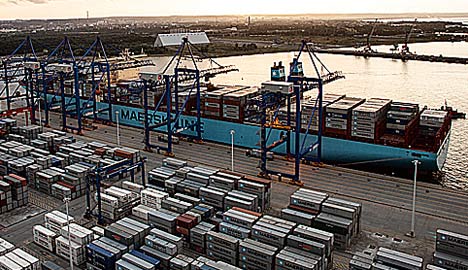BUSINESS
Maersk alliance sunk by Chinese authorities
Danish shipping giant's announced partnership with French and Swiss companies was blocked by China, which cited "a high level of concern" on competition.
Published: 17 June 2014 18:59 CEST

In a statement, Maersk pledged that the decision would not affect its relationship with China. Photo: Maersk
In a surprise decision, China on Tuesday blocked an alliance among the world's three largest container operators, including Denmark's A.P. Moeller-Maersk, citing a negative impact on competition.
The alliance would have teamed Maersk up with France's CMA CGM and the Swiss MSC Mediterranean Shipping Company in the so-called P3 Network, which they announced in June last year.
The aim was to cut costs on Asia-Europe, trans-Atlantic and trans-Pacific routes by creating a system similar to code-sharing agreements among airlines, allowing the companies to put cargo on each others vessels.
But China's commerce ministry said in a statement it had decided to prohibit the alliance after conducting an anti-trust assessment. The ministry said the alliance, had it gone ahead, would "have a far-reaching impact on the global shipping industry and cause a high level of concern in all sectors".
It added that the alliance would increase the parties' "combined capacity in container shipping on Asia-Europe routes" and give them a "substantial increase in market concentration".
The decision may be an indication that China is becoming less tolerant of business agreements that it sees as detrimental to competition.
So far China has blocked only one merger, the planned acquisition of Chinese juice maker Huiyuan in 2009 by US-based Coca-Cola.
Mario Mariniello, a specialist on competition policy and regulatory issues at the Brussels based think tank Bruegel, noted that in 97 percent of cases China's competition body MOFCOM has approved mergers without requiring any commitments.
However, he noted that in China "the impact on national competitors is a factor" while "in Europe, you only take into account the impact on customers."
In response to China's decision the shipping companies said they were giving up the plan.
"Today, the Ministry of Commerce of the People's Republic of China announced that they have not approved the P3 Network," Maersk said in a statement.
"Subsequently, the partners have agreed to stop the preparatory work on the P3 Network and the P3 Network as initially planned will not come into existence," it added.
The decision was not expected to impact the group's annual results, said Maersk.
"The decision does come as a surprise to us, of course, as the partners have worked hard to address all the regulators' concerns," chief executive Nils S. Andersen said.
The alliance had already been greenlighted by regulators in Europe and the United States and would have enabled Maersk to reduce costs and carbon emissions. Andersen said he was "quite confident Maersk Line will accomplish those improvements anyway."
The group's shipping business has outperformed the troubled sector over the past few quarters partly due to cost cuts.
"Maersk is the one that suffers the least from this drawback because they have the highest margins," Germany's MainFirst bank analyst Tobias Stig told AFP. "The other two had much to win."
Maersk's A-share closing price was down by 5.1 percent on the Copenhagen Stock Exchange, where the main index was 0.11 percent lower.
Url copied to clipboard!


 Please whitelist us to continue reading.
Please whitelist us to continue reading.
Member comments